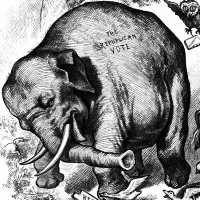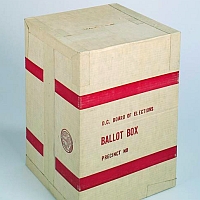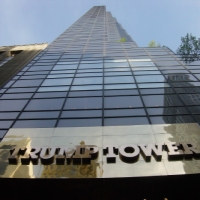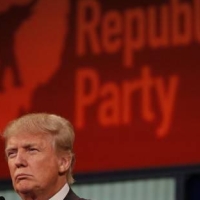- About Us
- Columns
- Letters
- Cartoons
- The Udder Limits
- Archives
- Ezy Reading Archive
- 2024 Cud Archives
- 2023 Cud Archives
- 2022 Cud Archives
- 2021 Cud Archives
- 2020 Cud Archives
- 2015-2019
- 2010-2014
- 2004-2009
 |
Cud Flashes In The Pan |
This month’s theme:
Planet Trump II
Last month, the theme was Planet Trump, and it explored some of the hellish things that might happen were Trump to become president. I’m continuing that theme here, because what used to be entertaining dystopian fiction is now seeming more possible than ever. If that man were actually elected president, what dreadful things could he do to the country and the world? What if his outlandish policies came to pass? And what might his legacy be?
Once you’ve read these, here’s some suggested reading:
https://en.wikipedia.org/wiki/Narcissistic_personality_disorder
“Idiots Trump Intellectuals”
Dystopian
By David M. Fitzpatrick
“You ain’t goin’ to vote today, Zeke?”
“Nah. No need to. Republicans done made sure us folks don’t have to.”

“How’s that, Zeke?”
“Ain’t you paid attention to the Fox News, Billy? Them Republican leaders made it easy for us. Got that absentee voting done.”
“Ain’t that when you mail in your vote?”
“No, that’s for them Democrats. Now, if yer registered as a Republican, and ya don’t show up to the polls, then yer ballot goes in automatically with votes for all Republicans.”
“Oh, yeah, guess I did hear ‘bout that. Somethin’ ‘bout proxies.”
“That’s it. So the local Republican Party gets to be the proxies, and if we don’t show up to vote, then they just do the votin’ for us. Democrats weren’t smart enough to do the same thing. Now they lose all the time!”
“I hear there’s lots of us, Zeke. Lots of hard-working folks who want Republicans to get elected.”
“Sure are. Some of us is smart, Billy. We know it’s important to keep tradition goin’ on. Things ain’t never gotta change. We gotta keep ‘em the same, keep them Democrats from changin’ ‘em. Those Democrats are wagin’ a war on Christianity and American values, and only Republicans can stop them. Thank God and the GOP that they got those proxies in place.”
“Yeah, Zeke! Now we don’t even have to go vote, and we still vote!”
“Praise Jesus, Billy. Best part is, we got so damn many people like us that the Democrats can’t compete. Y’all know they think we’re a bunch of redneck idiots, right?”
“Yeah, and they act like they got all the smart folks on their side. Guess they ain’t so smart after all, if all us dumb guys outnumber ‘em!”
“You said it, Billy. Now let’s get back to work. This here coal ain’t gonna mine itself.”
“Business Trumps People”
Dystopian
By David M. Fitzpatrick
“I’m here to vote,” the man said. “I’d like my two ballots, please.”
He wore a perfect blue suit with a red-striped tie and an American flag on his lapel. His hair was perfect and his smile was wide and white. Laverna Johnson sighed to herself and regarded him. Sitting next to her was her daughter, Emily, watching intently with her wide, blue, nine-year-old eyes. She was there to learn about the election process.
“Name?” Laverna asked.
“Ben Ford.”

“Per the Voting Protection Act, I need three forms of identification.”
Ben reached into his suit-jacket pocket and pulled out a pile of paperwork. He dutifully handed it to her. “I trust there are three qualifying items there.”
Laverna sifted through everything. “The Social Security card is invalid, since Social Security was dissolved,” she said. “And you know this gun permit is invalid, since all gun-control laws were revoked.”
“Oh, of course,” Ben said as she handed them back to him. “But the rest is okay?”
She held up the remaining three. “Driver’s license and passport are always acceptable. And since your church-membership identification is to a Christian church, it’s valid. You’re all set.”
Laverna was acutely aware of her young daughter beside her, soaking this all in. Good. That was exactly what Emily needed. She needed to learn what had happened to voting rights in this country.
“Is this your daughter?” Ford asked.
Laverna wanted to tell him that it was none of his fucking business who the girl was, but of course Emily answered first. “I’m learning about how voting work,” she said.
“Oh, very nice,” Ford said, smiling ever wider. “It’s so important that children learn the power of the voices we have as voters.”
Laverna wanted to reach over the table and slap the shit out of the man, because she knew that this guy was getting a second ballot. She wondered how dreadful that one would be—but one thing at a time. She scanned his three valid forms of ID into her computer, and the printer promptly spit out a customized ballot. She checked it over before handing it to him. At the top it read:
INDIVIDUAL CITIZEN BALLOT
for
BENJAMIN ALLEN FORD
VALUE: One (1) vote
“There you go,” she said as she handed it to him. In earlier days, she would have added “sir” to that just to be polite, but these days she was selective about which people earned her respect. This guy wasn’t one of them.
“Thank you,” he said, his own politeness frustrating her. “And my second ballot?”
“I’ll need proof of business for that one.”
He fished out his federal business license and handed it to her. She saw that it had been updated just the day before. There was a lot of information, such as that he owned a convenience store and was the sole shareholder, but Laverna only cared about the total number o
f people employed there. It was eleven, including himself.
Laverna gritted her teeth and scanned it. The printer spit out another customized ballot and she checked it over before handing it to him. It said:
CORPORATE CITIZEN BALLOT
for
FORD’S VARIETY AND DELI
VALUE: Eleven (11) votes
She handed it to him. She couldn’t bring herself to say another word to him.
He either didn’t notice or didn’t care, and his smile couldn’t have been wider. “Excellent!” he spouted, and then he was off to find an empty voting booth. He was no sooner out of earshot than Emily was all full of questions.
“Is that what you were telling me about, Mama?” she asked. “His second ballot was for his business? He gets to vote more than once?”
“He votes as himself on his first ballot,” Laverna said. “On his second, he votes as his business. He has eleven employees there, including himself, so whatever he puts on that ballot gets counted eleven times.”

“But what if his employees don’t want to vote the same way?”
“They get to vote as individuals. But the new laws say that corporations have all the same rights as people, so now they get to vote, too. And since corporations pay people for their work, they get to cast votes for every employee, however the corporations see fit.”
Emily slumped back in her seat, furrowing her brow, deep in thought. After several moments of contemplation, she sat up straight and asked, “But how is that fair?”
“It isn’t fair. But that’s the laws President Trump got passed.”
“How does it make sense? How does one business get to vote one way no matter how many employees it has?”
“It was inspired by political endorsements. When an organization chose to endorse a political candidate, it did so on behalf of the majority of its members, even though—okay, hang on, we’ve got another one.”
Another blue suit was approaching their table, and he was also full of smiles.
“I’m looking forward to this,” he said, jovial and beaming. “I need two ballots today—one for me, and one for my corporation. Here’s my federal business ID.”
He handed it over, and she took it. The man owned seventeen factories in the United States. He had over six thousand employees. She felt her eyes bulge a bit, and then heard Emily suck in her breath. The girl was leaning in to have a look, and the sharp little girl had figured it out.
Emily whirled to the man, her eyes wide. “You get to vote six thousand times for your company?”
“I sure do, young lady,” he said. “Thank God for the new Voting Protection Act.”
Emily looked at her mother, incredulous, and Laverna shot back a look that Emily knew meant to keep quiet. But the man wasn’t done.
“Most of my factories were overseas with non-American workers, but once they passed the VPA and gave businesses voting power, I moved them all back here,” he said. “So not only do businesses get to put people in office, but we bring and keep jobs and production in the United States. Ain’t freedom great?”
“It sure is,” Laverna said. She knew exactly how great freedom was, but only from her memories. She silently vowed to make sure that Emily would always know that it did once exist.
“Donald Trumps the Constitution”
Dystopian
By David M. Fitzpatrick
Deshawn Ortiz woke from his coma and he immediately remembered the car accident—the impact, the sound of twisting metal and shattering glass, even the airbag going off. But everything after that sudden moment was a blank. Luckily, a nurse was in his room when he woke, and she greeted him happily and rushed to get the doctor.
He was Dr. Lebowitz, a balding man with glasses and a yarmulke. He arrived with a quiet woman with big heels, a below-the-knees skirt, a conservative hairdo, and an American flag pinned to her blouse. Lebowitz introduced himself as the doctor who had overseen his care, and introduced the woman as a government social worker named Sally Armstrong. That seemed strange to Ortiz, but he was dealing with plenty of other strangeness.
“You’re lucky to be here, Deshawn,” Lebowitz said. “You’ve been in a coma for nearly five years, and a lot has changed in this country since then. That’s why Ms. Armstrong is here.”
“I don’t understand,” Ortiz said. “Why am I lucky? That I survived the car accident?”
“That you survived your hospital stay,” Lebowitz said, grim and somber. “We understood that you have no living family.”
“Yes, my mother died of cancer a year before my accident,” Ortiz said. “My dad died in Afghanistan. He was an Army Ranger. But why does that matter?”
Lebowitz seemed to squirm where he stood, shooting a glance to Ms. Armstrong, who Ortiz now realized seemed a bit annoyed, as if she had something else she’d prefer to be doing. But now she spoke up, and with every emphasized syllable she seemed more and more arrogant.
“Your father was born in Mexico and immigrated to the United States at age twenty, and soon became a citizen,” she said. “Your mother was an African American woman who was born here, but she converted to Islam after your father’s death.”
Ortiz felt his internal alert going off, and he didn’t know why. “BUT she converted? What’s that supposed to mean?”
“A lot has happened since your accident, Mr. Ortiz,” she said, her voice as icy as her demeanor and as cold as her stare—maybe it was a glare. “President Trump’s administration pushed some key legislation through Congress—”
“President Trump?” Ortiz echoed. “The guy actually got elected?”
“Of course he did. And one of his first acts was to push through Congress, and then sign, the Natural-Born Citizens Only Act, which stripped citizenship from anyone who was not born here. Your father was one of those people.”
Ortiz almost came off the bed, but he was still sore from five years of lying there. “You’ve got to be kidding me!” he cried.
“I don’t kid, Mr. Ortiz. Now, you would have been okay had your mother not converted to Islam. Another bill President Trump signed into law was the Christian Reclaiming of America Act, which stripped most non-Christians of citizenship, regardless of where they were born. As a result of both of your parents becoming retroactively non-citizens, your birth citizenship was then revoked under the terms of the act.”
Ortiz was stunned, and he grabbed the hospital bed’s safety bars and struggled to pull himself upright, fighting against the stiffness and soreness. “This can’t be right. There’s no way this is right.”
Ms. Armstrong smiled in smug sweetness and stepped forward, crossing her arms tightly over her chest.
“It is right, Mr. Ortiz. There are legal challenges everywhere, but with President Trump having nicelys tocked the federal courts, and his rebuilding of the Supreme Court with six strong conservatives, his legislation will stick. So I’m here to process you out, Mr. Ortiz—because you should have been deported years ago, when that legislation passed. But the president, because he is a caring person, allowed into his revised deportation rules accommodation for those in dire medical necessity. You were deemed such, thanks to Dr. Lebowitz.”
She shot an accusing glance at Lebowitz, who Ortiz had almost forgotten was in the room, as if she’d caught him with his pants down. The doctor stared at the floor, his face hard and dark.
“Your deportation isn’t a question, let me be clear on that,” Ms. Armstrong continued. “But there remains your medical bills. You’ve been here for five years and the cost of your care is substantial. Before we deport you to a country that will receive you, you’ll be required to pay those bills.”
Ortiz’s head was spinning. It was as if he’d awakened in an alternate reality. It might well have been just that.
“There shouldn’t be medical bills,” he said. “I had a great policy. I paid a lot for such a great policy. It will cover all of this.”
“Afraid not. Congress repealed the Affordable Care Act in its entirety, and then passed new health-care legislation. Your policy was capped at a $100,000 maximum payout, and of course it was canceled when you couldn’t pay premiums while you were in your coma. You owe millions.”
“Millions?!” Ortiz cried. “Let me make sure I’ve got this all straight. You’re telling me that I’m not a United States citizen any longer, my insurance policy was canceled, and I have to pay my bills before you throw me out of the country?”
Ms. Armstrong brightened. “Well, there you go, Mr. Ortiz—very nicely put. I wondered whether a man of your genetics would be able to reason it. African American on one side, Hispanic on the other—two non-white lineages that were declared subhuman under the revised United States Constitution. Even if you hadn’t lost your citizenship, Mr. Ortiz, you still would only have counted as three-fifths of a person.”
Ortiz stared at her from his bed, mouth hanging open, eyes wide. He couldn’t have spoken if he’d visualized anything he wanted to say at that point.
“Well, congratulations on your recovery,” Ms. Armstrong said with another smug, sweet smile. “But our review of your assets indicate that you won’t likely be able to pay this, unless a wealthy benefactor comes forward—and there aren’t many who favor your kind who have much money these days. As soon as Dr. Lebowitz certifies that you’re medically cleared, you’ll be sent to one of the new debtor’s prisons—probably for the rest of your life, I would imagine.”
As if she’d just delivered good news, she gave a little wave to accompany her broad smile, spun about, and left. Ortiz stared after her, still stunned into silence, listening to her heels clicking off down the hospital corridor. Then he finally turned to Lebowitz, who was looking at him with sadness in his eyes.
“This is all a joke,” Ortiz said. “Right? Please tell me it’s all a joke.”
“I wish it were,” Lebowitz said. “So much has changed, Deshawn, and so quickly. Once Trump had power and the Tea Partiers took over Congress, they began passing some horrible stuff. And don’t think it only applies to you. You notice my last name is Lebowtiz, right?”
Ortiz nodded. “I noticed the yarmulke. You’re Jewish.”
Lebowitz nodded, and then he slid his lab coat off.
On his forearm was a tattoed bar code.
But on his upper arm, over his short-sleeved shirt, was a yellow band adorned with a blue six-pointed star.
Ortiz sucked in his breath. “Are you shitting me?”
“I wish I were. I’m not Christian, so I’m not as much of a human as they are. I’m sorry to tell you, though, they deem me more of a human than you. I’m four-fifths of a person, they say. So I can stay, but I have to wear this armband and be tattooed. We’re the only non-Christians even allowed in the country, and there’s talk of changing that.”
Ortiz collapsed back onto the bed, staring at the ceiling tiles and breathing heavily. He felt light-headed. “I can’t believe any of this. And… how the hell did he win election? How the hell did he possibly beat Hillary Clinton?”
“She got sick—pneumonia, they said, but many think she was poisoned. And Tim Kaine died in a mysterious helicopter crash… Democrats tried to field new candidates, but it was two weeks from the election. Too many people voted for minor candidates, and Trump won. And once he was in… it didn’t take long.”
“I’m going to prison,” Ortiz said. “I can never pay that money.”
Lebowitz looked out the door as if expecting a wild animal to suddenly attack. He hurried over and closed the door, then returned to Ortiz’s bedside, and he leaned in close.
“You have one hope,” Lebowitz said, almost whispering. “Thanks to your father, you hold Mexican citizenship. We’re just a few hours from the border. If you can make it to Mexico, Trump can’t touch you there—at least, not yet. As soon as you’re well enough… you’ll have to slip out at night. I can help you get out of here, but once you’re out, you’re on your own to get to Mexico.”
“Then that’s what I’ll have to do,” Ortiz resolved.
“There’s just one thing that might stop you,” Lebowitz said.
“And that is?”
“That damn wall at the border.”
“Megalomania + Power Trumps Everything II”
Dystopian
By David M. Fitzpatrick
In the Oval Office, President Donald Trump was mad as a hornet at his chief of staff.
“What do you mean, they refused to launch nuclear weapons?” he hollered.
“That’s correct, Mr. President,” the chief of staff said. “They disagreed with your order and opted to not fire.”
“Let me tell you something, I’m the president of the United States, okay? I’m the commander-in-chief, and you’re telling me that a bunch of military people refused to turn some keys?”
“It seems so, Mr. President.”
Trump’s face would have looked red with anger if it weren’t already orange with bad tanning decisions. “This insubordination is yuge. I’m trying to make America great again, I kid you not. I can’t do that if these people don’t do what they’re told. Tell ‘em they’re all fired.”
“I believe they’ll be charged under the Uniform Code of Military Justice for failure to obey orders,” the chief of staff said, “but I hear reports that they won’t be prosecuted or at least not convicted.”
“It feels like a military coup,” Trump said, “but that can’t be. I’m very popular with the military people, believe me. Most of them voted for me, okay?”
“Yes, sir. They’re just concerned about the launch order.”
Trump pounded his fist on his desk. “Listen, I’ve opened up great lines of communication with Vladimir Putin and Kim Jong-un, okay? I’m the best at opening up lines of communication, I think we can all agree on that. I’ll tell you what, no president has ever formed alliances with those guys. So the military people have to trust me when I give them an order. There’s no working with this country I tried to attack, no deals to be made. And if they’re going to be stubborn, then they’re getting nuked.”
“I understand, sir. It’s just that… well, America has a long relationship with England, and your decision to nuke London took too many of them by surprise. They felt that… that even you finally went a bit too far.”
Trump leaned back in his big chair, considering this. “What do you think? Is nuking London a bit too much?”
“Probably, sir.”
“Okay, I’ll do a press conference to straighten this out. Let me tell you, this will be an amazing press conference. But first, let’s round up every military person who refused to launch and execute them for treason. Don’t let the press know about it. It will send a message to the generals, believe me.”
“I don’t think you can do that, Mr. President. Treason is very specifically defined, and not following orders doesn’t qualify.”
Trump considered this for a moment, and then picked up his phone. “Get me the Speaker of the House, the Senate Majority Leader, and the Vice President on the line,” he barked.
It took a few minutes, but once he had them, on, he laid it out.
“We need a rush job on some new legislation, okay?” he said. “I don’t like how the law works, so I’m going to make a new law. It will be the best law. It goes like this: Anyone in the military failing to follow the orders of the president of the United States is guilty of treason and will be executed. Fast-track this through Congress and I’ll sign it immediately.”
* * *
Trump took the podium at the White House Briefing Room and explained everything. When he was done yammering away—which took about twenty minutes—he took questions.
“So you’re saying that you never gave an order to nuke London?” a reporter asked.
“Absolutely not,” Trump said. “Many people are saying that those Democrats are still sore and what’s left of their crooked party is trying to make me look bad.”
“We have sources confirming that you did order the nukes, and that military officers refused to launch,” another said.
“All untrue. We would never nuke London. I love London, I love England. And the England people love me, I can tell you.”
“So all of these sources are lying?”
“Of course. I’m telling you what really happened now, and nobody tells what really happened better than me. In fact, as I said, what happened was some of these military officers went rogue and tried to launch nuclear weapons at London. And they were all stopped by loyal American military people. These are high-ranking types who put a stop to this, believe me.”
“But WikiLeaks has released images and audio recordings of orders specifically sent by you ordering the attacks.”
“Look, everybody, I have golf courses in Scotland. Why would I nuke a country right next door? Now, you want to figure out where this is coming from, look no further than the Obama-Clinton failures that resulted in this chaos of lies…”
His chief of staff stood dutifully by, listening as Trump took more questions, lied in answer, talked in circles, and evaded them all. When the press conference was over, Trump met the chief of staff in the West Wing corridor.
“I can tell you I’m tired of these reporters,” he said. “Who do they think they are, asking so many questions?”
“They think they’re the fourth estate,” the chief of staff said.
“Well, I built my empire on real estate, so the first thing I’ll do is buy this fourth estate,” Trump said as they entered the Oval Office. “In the meantime, no more of these press conferences. These guys just aren’t fair. Ban all reporters from the White House, and tell them we’ll be issuing statements instead. If they’re lucky, I’ll take questions at my weekly rally at the Trump House. Speaking of that, how is construction on the Trump House coming?”
“Ahead of schedule, Mr. President,” the chief of staff said as Trump sat behind his desk and put his feet up on it. “It’s filling up the South Lawn nicely. But the protesters are really getting angry. There are lots of people upset that there won’t be an Easter egg roll anymore.”
“They’ll get over it. Kids don’t need free Easter eggs, believe me. Look at me—no free eggs for me. All I started with was a small loan of a million dollars from my father, and I made my own business empire. And look at me now! Americans should see me as the model for success.”
“Judging by the election results, a good many of them do, sir.”
David M. Fitzpatrick is a fiction writer in Maine, USA. His many short stories have appeared in print magazines and anthologies around the world. He writes for a newspaper, writes fiction, edits anthologies, and teaches creative writing. Visit him at www.fitz42.net/writer to learn more.
